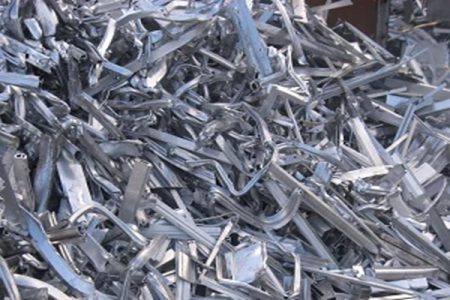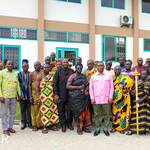The Ghana Integrated Aluminium Development Corporation (GIADEC) has initiated the development of a far-reaching legislative policy framework to regulate downstream aluminium sector.
This transformative move comes at a critical juncture in the country’s industrial evolution and addresses growing concerns over economic sabotage, environmental degradation, and criminal exploitation of the unregulated aluminium value chain.
GIADEC Chief Executive Officer Mr. Reindorf Twumasi Ankrah has the firm backing of the Minister for Lands and Natural Resources, Emmanuel Armah-Kofi Buah to act.
Legal authority and institutional mandate
GIADEC’s actions are firmly grounded in its legal mandate under the GIADEC Act (Act 976), which empowers it—together with the sector Minister—to implement policies for the effective and sustainable development of Ghana’s integrated aluminium industry.
This statutory authority strengthens the legitimacy of the proposed policy framework and provides a solid foundation for its enforcement.
In addition to its regulatory duties, GIADEC serves as the state’s commercial anchor in the aluminium sector.
It is the sole owner of the Volta Aluminium Company (VALCO) and holds all of the Government’s interests in the Ghana Bauxite Company.
This dual role—as both regulator and stakeholder—gives GIADEC the strategic vantage point to steer the industry toward a more secure, sustainable, and profitable future.
A turning point for industrial future
The proposed regulation of the downstream aluminium sector is more than a policy intervention—it is a vision for transformation. By bringing order to a space historically dominated by informality and exploitation, GIADEC and the Ministry of Lands and Natural Resources are laying the foundation for a stronger, cleaner, and more inclusive industrial economy.
This is a critical turning point for Ghana. The success of this initiative could serve as a blueprint for other sectors plagued by informality and criminal infiltration.
It also reaffirms the state’s role as a custodian of national assets and a driver of sustainable development.
A sector under siege
The downstream aluminium industry—which includes the dealing, casting, and fabrication of aluminium into sheets, rods, foils, and various structural forms—has become an unexpected hotspot for criminal activity.
Recent revelations about a sophisticated, multi-million-dollar cartel targeting the Electricity Company of Ghana through systematic cable theft have sparked national outrage and raised red flags about vulnerabilities in Ghana’s industrial and energy sectors.
Stolen materials, including valuable copper and aluminium cables, often find their way into informal and unregulated smelting operations.
These facilities operate outside the purview of environmental and safety regulations, making them ideal destinations for illicitly obtained goods.
The lack of oversight has created a parallel economy—one that undermines legitimate businesses, compromises national infrastructure, and threatens public safety.
The significance of the move
GIADEC’s proposed legislative framework is not merely regulatory—it is strategic.
It signals a profound shift toward structured industrial governance in a sector long neglected.
This initiative is significant not only for its ambition but for its necessity.
The rampant theft of industrial materials has created economic instability and public mistrust.
By stepping in decisively, GIADEC and the Ministry of Lands and Natural Resources are reasserting state control over a critical national asset.
The regulation of the downstream aluminium industry also has broader implications for national security, environmental sustainability, and socio-economic development.
It is a bold attempt to balance enforcement with empowerment, bringing order to chaos while nurturing new opportunities.
Building a transparent supply chain
Central to GIADEC’s vision is a robust identification, registration, and certification system for all players operating within the downstream aluminium space.
This approach, once implemented, will inject much-needed transparency into a sector currently marked by opacity and informality.
By mandating a certificate of origin for all aluminium imports and exports, GIADEC aims to ensure that all aluminium traded—domestically or internationally—can be traced back to a legitimate source.
This traceability is vital. It will act as a safeguard against the laundering of stolen goods through legitimate supply channels.
It will also serve as a quality assurance mechanism, elevating Ghana’s profile in the global aluminium market as a country committed to ethical and responsible industry practices.
Sustainable industrial development
Beyond addressing criminality, the proposed regulatory framework is also poised to improve safety, product quality, and environmental compliance.
Many of the informal smelters and processing units currently in operation employ outdated and harmful techniques that contribute to environmental degradation.
Under the new policy, these entities will either be brought up to standard or phased out in favour of environmentally sound alternatives.
This marks a pivotal step in aligning Ghana’s aluminium industry with international sustainability standards.
It also reinforces the country’s commitment to green industrialization and responsible resource management—an increasingly critical factor for international trade partnerships and investment.
Empowering the next generation
Importantly, GIADEC’s regulatory push is not limited to enforcement.
It is part of a wider developmental strategy that includes youth-focused entrepreneurship training programs.
These initiatives will train young Ghanaians in responsible sourcing, traditional can smelting, and domestic aluminium fabrication.
The goal is to create a new generation of entrepreneurs who are both technically skilled and ethically grounded—capable of participating in and transforming the aluminium sector from within.
This approach represents a proactive investment in human capital and reflects a clear understanding that economic security must go hand-in-hand with regulation.
It also supports Ghana’s broader national development goals, particularly those focused on job creation and inclusive industrial growth.
As Ghana stands on the cusp of industrial maturity, the regulation of its downstream aluminium sector is both a necessity and an opportunity.
- Friday, April 25, 2025 Newspaper Headlines - 25 April 2025
- Valeria, the amputee giving 1,000 other amputees new life - 25 April 2025
- Moses Baiden calls for unified African tech strategy - 25 April 2025

